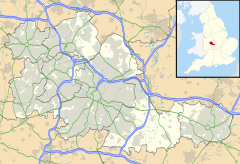Aldridge
| Aldridge | |
|---|---|
| Aldridge shown within the West Midlands | |
| Population | 26,988 (2011.wards) |
| OS grid reference | SK056009 |
| Metropolitan borough | |
| Metropolitan county | |
| Region | |
| Country | England |
| Sovereign state | United Kingdom |
| Post town | WALSALL |
| Postcode district | WS9 |
| Police | West Midlands |
| Fire | West Midlands |
| Ambulance | West Midlands |
| EU Parliament | West Midlands |
| UK Parliament | |
Aldridge is a large village within the Metropolitan Borough of Walsall, in the West Midlands, England. Historically it was part of the county of Staffordshire, but in 1974 it was incorporated into the West Midlands county. It also became part of the borough of Walsall at this time, having originally been an independent local authority and then being merged with neighbouring Brownhills to form Aldridge-Brownhills UDC in 1966. Aldridge was twinned with Montelimar, France in May 1964. Aldridge is a relatively affluent area of the West Midlands that has mostly private homes that have been built since the 1920s.
Aldridge was recorded as a settlement in the Domesday Book of 1086, though the now much larger settlement of Walsall was not. It was valued at 15 shillings under the name of "Alrewic", which may have originated from an abundance of Alder trees in the area.
Aldridge began as a small agricultural settlement, with farming being the most common occupation up until the 19th century.
In the 1800s, Aldridge became an industrial town with coal mines and lime kilns. The coal and clay in the area prompted many to set up collieries and brickworks. Aldridge clay is especially useful in the manufacture of blue bricks. The 1881 census shows that the mines and brick works were major employers. Because the coal and clay beneath the eastern side of Aldridge (towards Stonnall) is located much deeper under the surface, extraction of this coal and clay would not have been economically viable. As a result, farms continued to dominate the eastern part, though a sand quarry was set up and still remains on Birch Lane.
During the 20th century modern shops were built in the centre of Aldridge, as well as council buildings. After the Second World War Aldridge became a dormitory town, or suburb, of Birmingham. A small airport called Aldridge Airport was used during the Second World War and after was used for passenger services.
...
Wikipedia

